Offshore Outsourcing
Definition
What is offshore outsourcing?
Offshore outsourcing refers to the practice of transferring some functions of your business to a company in a different geographic location, particularly offshore destinations like the Philippines, India, and Malaysia.
Organizations usually use this strategy to access a wider talent pool at a low overhead cost without sacrificing the quality of work done.
Offshore outsourcing helps strengthen a business’s performance and compete with other organizations in the industry.
To do this, companies partner with established and trusted outsourcing service providers to ensure high work quality and accountability.
Partnering with a trusted BPO provider assures organizations the following:
- Employees who underwent a thorough interview process to ensure suitability for the needed role
- Workers going through proper onboarding, training, and upskilling sessions
- Satisfied employees, since they will be provided with high-quality equipment and a Class A physical office
- Accountable and manageable upper management
- Clear targets and KPIs for the offshore team
- Efficient processes and standard operating procedures
- Legalities and other documentation to be well taken care of, among others
Further, offshore employees can help manage essential business operation tasks, which means you and your in-house employees have more time to focus on your own responsibilities.
This boosts focus, productivity, and employee fulfillment — all while the company saves up to 70% on labor costs!
This article aims to provide a comprehensive understanding of what offshore outsourcing means and provide examples of its many benefits.
We will also discuss the history of offshore outsourcing, learn why businesses resort to offshore staffing, discover its pros and cons, as well as learn the types of offshore staffing.
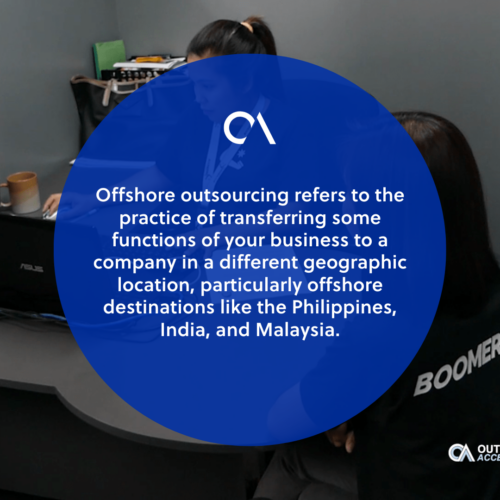
Offshore outsourcing definition
Offshore outsourcing, also referred to as business process outsourcing (BPO), is the process of having work done for your business using qualified staffing solutions from countries with lower labor costs.
Commonly, IT, sales, and administrative roles are carried out for businesses across the world from countries such as the Philippines and India.
Companies can benefit from accessing other countries that have more resources for people with specialized skills. At the same time, they get quality work at a fraction of the costs.
Like nearshore outsourcing, companies prefer having minor tasks outsourced to a service provider so that the in-house team can focus on the core business functions.
One perk of offshore outsourcing for businesses is that they do not need to think about the overhead expenses when they hire domestically.
Overall, the company could benefit from lower human resources costs, equal or higher-quality outputs, and higher profits.
About offshore outsourcing
- Offshoring history
- Benefits of offshore staffing
- Why do businesses resort to offshore outsourcing?
- Offshore outsourcing examples
- What services you can outsource
- Pros and cons of offshoring
- Offshore outsourcing in the Philippines
- Types of offshore outsourcing
Offshoring history
Deploying manufacturing jobs out of the country has been a common business method since the 1960s.
This well-known business strategy started with outsourcing. Outsourcing is when an organization farms out parts of its business processes to an external company.
While it may seem like a current phenomenon to many, the truth is it has been going on since the 1950s.
However, it wasn’t until the 1980s that corporations perceived it as an effective business strategy. It was also in that year when companies mainly outsourced to allow them to have a greater focus on their core competencies.
Then in the 1990s up to the early 2000s, organizations started to concentrate more on the cost-saving measures of outsourcing.
Now, this is the time when strategic outsourcing has emerged, and the goal is to gain a competitive advantage in the industry.
Fast forward through time, given today’s technological advancements, it is easier for companies to delegate both their core and non-core functions to the external workforce in different countries.
Offshoring revolutionizes organizations and how they perform their daily operations. It transforms business landscapes into agile structures that boost its overall profitability.
Benefits of offshore outsourcing
The world is becoming increasingly globalized. Technology, software, and communications improvements now enable easy access to a globalized workforce.
This has many advantages, but the primary benefits of offshore staffing are:
Cost savings
One of the leading reasons for offshore outsourcing is the potential to reduce labor costs. Companies can take advantage of lower wage rates in other countries, which can significantly impact the overall cost of production or service delivery.
Also, some countries may have lower infrastructure and operational costs, contributing to overall cost savings (typically 60%-80%).
Access to global talent
Offshore outsourcing allows businesses to tap into a global talent pool.
Companies can access specialized skills and expertise that may not be readily available in their home country, leading to improved product or service quality.
Focus on core competencies
Outsourcing non-core functions enables companies to concentrate on their core competencies. This strategic focus can enhance efficiency and productivity, as resources are directed toward areas that contribute most to the organization’s success.
Time zone advantage
Offshore outsourcing can provide a time-zone advantage. Companies can create a 24/7 working environment by leveraging the time differences between their home country and the offshore location.
This can result in faster project turnaround times and increased productivity.
Flexibility and scalability
Outsourcing allows businesses to be more flexible and scalable. They can easily scale up or down their operations based on business demands without the challenges of hiring or laying off in-house staff.
Risk mitigation
Offshore outsourcing can help spread business risks. Diversifying operations across different geographical locations can reduce the impact of local economic or political fluctuations on the overall business.
Innovation and technology
Access to global talent often brings in diverse perspectives and innovative ideas.
Outsourcing to locations with advanced technological capabilities can also result in the adoption of the latest technologies and methodologies.
Faster time-to-market
Offshore outsourcing can accelerate time-to-market for products and services. With a global team working on different aspects of a project simultaneously, companies can bring their offerings to market more quickly.
The benefits of offshore staffing impact small, medium, and large enterprises across the globe. Businesses can access more affordable resources to help streamline and grow their business. This is a win-win for all parties involved.
Despite these benefits, it’s crucial for businesses to carefully evaluate the risks and challenges associated with offshore outsourcing, such as cultural differences, communication barriers, and potential quality issues.
A well-planned outsourcing strategy that aligns with the business goals and values is essential for success.
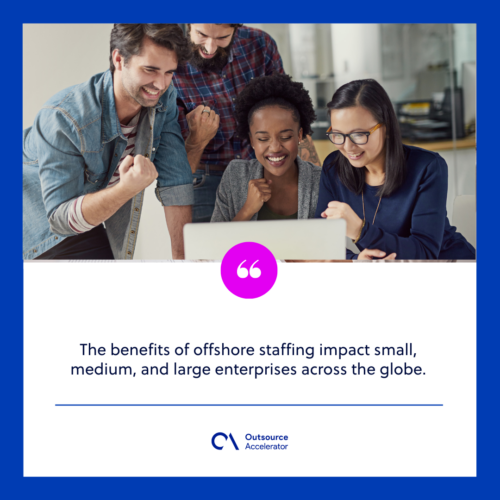
Why do businesses resort to offshore outsourcing?
Companies do not just switch to offshore outsourcing due to its cost-effectiveness.
Rather, more and more companies these days are acknowledging the other relevant advantages of offshore outsourcing to the market:
To save up to 70% on labor costs
Businesses always have to look for ways they can obtain a stable stream of revenue while sustaining their daily operations.
However, because of the economic fluctuations and its unpredictability, other companies couldn’t afford the costs of local operations. This is where offshore outsourcing can come in handy.
To stand out in a sea of tight competitors
Another reason for offshoring is to stay competitive, especially with the global economy.
Like for example, with customer service, businesses are able to boost their efficiency and daily operational procedures with this strategic practice.
To keep up with the latest business trends
Entrepreneurs in this day and age know well enough that innovation is one key factor in their overall success. Thus, it is more achievable with offshoring.
To leverage professional and highly competent offshore staff
Other companies also resort to offshoring as a result of the lack of qualified local workers to do specific tasks. Countries like Australia experience skill shortages in the automotive industry.
It was the same as with the United States when Apple had to transfer its manufacturing to China due to the lack of a local labor force.
Offshore outsourcing examples
Businesses of all sizes rely on offshore outsourcing to delegate tasks to lower-cost countries but of equal expertise.
Just like nearshore outsourcing, companies prefer offshoring several roles so that the in-house team can focus on the vital functions of the business.
Here are some of the most popular offshore outsourcing examples:
Customer service departments through offshored call centers
One popular example of offshore outsourcing is customer service through call center companies. Every company needs a customer service department to cater to customers’ needs, but these operations can get very pricey.
As a business grows, more people are needed to handle queries and maintain customer satisfaction. Having an in-house customer service team may not be the best decision.
From coming up with standard operation procedures to staff and management training, running a customer service department alone can take so much time and effort, not to mention resources.
This is why offshore outsourcing of customer service roles and departments has become the norm
Virtual assistants
Almost anything can be done online:
- Need to book personal appointments or work meetings? It can be done online.
- Need to delegate social media posting and graphic design activities? Do it virtually.
- Need to develop codes for your website and/or mobile app? Outsource it online.
Almost everything can be done online, so business owners and companies offshore outsource tasks to general Virtual Assistants (VAs).
Offshore outsourcing tasks to general VAs has been a major game-changer, especially for small businesses. This is because outsourced staff ensure quality work while saving a lot of resources.
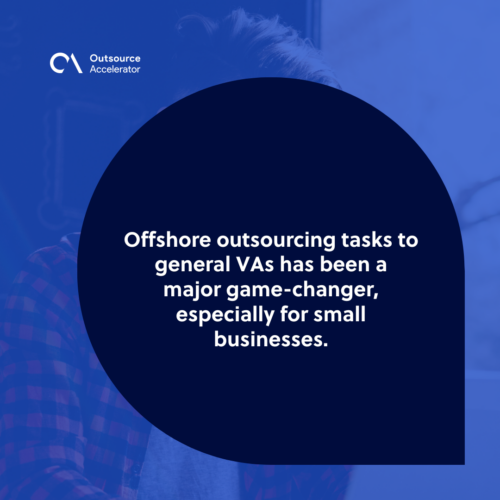
What services can you offshore?
Aside from manufacturing, organizations these days are able to farm out both their core and non-core functions to offshore providers.
One example of this is foreign companies that have been offshoring their call center in the Philippines. We all know that the country is known as the Business Process Outsourcing (BPO) capital of the globe and is well known for call center services.
However, aside from customer service and support, Information technology (IT), related job functions are also some of the leading offshored services.
In fact, according to statistics, the global IT outsourcing market is expected to be worth $98 billion from 2020 to 2024.
A lot of foreign companies have also tapped into offshoring their human resources tasks such as sourcing, hiring process, and more. More so, finance and accounting-related tasks like bookkeeping, tax filing, procurement processes, etc.
In terms of sales and marketing, offshore outsourcing companies like Six Eleven BPO offer global strategic solutions for different types of industry sectors.
Some of their services may include lead generation campaigns, industry and market research, and search engine optimization, among others.
Basically, companies can offshore nearly every part of their daily business functions to offshoring providers from around the world. This has been made even possible with the help of our modern-day technology and the availability of the internet.
Pros and cons of offshoring
Naturally, offshoring will always have its mix of advantages and disadvantages. Having said that, let’s see whether the benefits of offshoring outweigh its downsides:
Offshoring pros
Reduced labor costs
One good example of this is US companies that offshore to developing countries like the Philippines.
This allows them to reduce their overhead costs as Filipino workers have low compensation as compared to those hiring local in-house employees.
Availability of a skilled workforce
As we have mentioned earlier, one of the reasons why organizations offshore is the lack of skilled labor. Offshoring to countries like the Philippines and India grants international companies access to a skilled talent pool.
Both these countries have seasoned global talents who are English proficient and college degree holders.
24/7 operations
Foreign companies that offshore to another country with major time differences allow them to have their daily operations overextended hours.
Like in most cases customer services, these foreign companies are able to extend their contact center services even up to twenty-four hours.
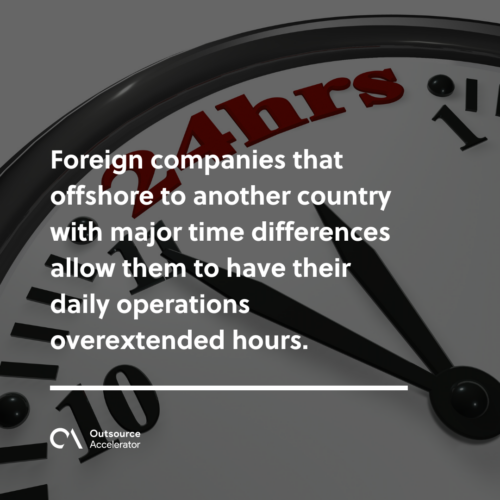
Increased focus on the business core
As businesses free up more on their job loads, this gives more time for leaders and in-house staff to focus on improving their core functions.
You can rely on a trusted outsourcing partner like HireSmart Staff to build a highly-skilled team to perform other tasks needed in your company.
It is also important to note that organizations that offshore are not just on the receiving end of this practice’s perks. In the Philippines, the BPO industry plays a huge role in terms of its economic growth.
The country’s BPO industry employs a lot of the working population in the Philippines.
Offshoring cons
Language barriers
This is perhaps one of the major drawbacks of offshoring. Usually, in countries like India and China, the English language isn’t the locals’ first language.
Another factor is when the offshoring provider comes from a region with a strong local accent.
Cultural differences
When offshoring to different countries, cultural and social differences are unavoidable.
For example, US business leaders may talk in a straightforward and candid manner, while a Filipino remote staff may be more reserved.
Quality control
Another concern for foreign companies is that offshoring also means that they will be giving up control over their offshored tasks.
Even if these clients provide quality guidelines, there will still be differences in terms of the working culture and environment.
Despite these cons, businesses still consider offshoring as a good business model for organizations of all shapes and sizes. Going back to offshoring to the Philippines, the country has ranked second among Asian countries with the highest English-speaking population.
More so, the country is also heavily influenced by Western culture as it has been colonized by the US and Spain for years.
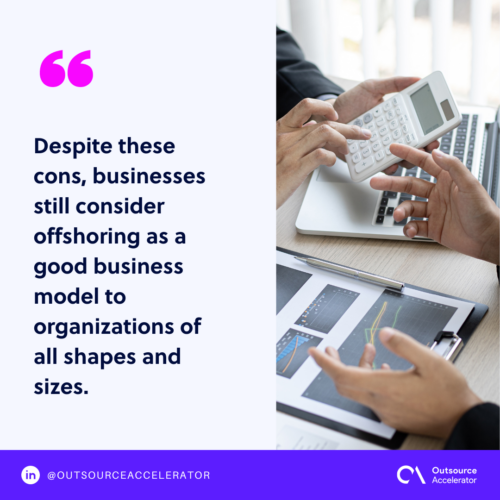
Offshore outsourcing in the Philippines
The Philippines is the leading offshore outsourcing destination in the world.
With 1.3 million BPO workers and counting, large corporations and even small to medium-sized enterprises all over the world trust that their Filipino workers and remote teams can provide excellent outputs, customer service, or IT assistance at a cost-effective price.
Outsource Accelerator provides you with the best customer service outsourcing companies in the Philippines, where you can save up to 70% on staffing costs.
We have over 5,000 articles, 350+ podcast episodes, and a comprehensive directory with 2500+ BPOs, all designed to make it easier for clients to learn about and engage with outsourcing.
Types of offshore outsourcing
Here are some types of offshore outsourcing, as listed by Rezaid:
There are many popular approaches and solutions that are used by businesses today – each with its own benefits and drawbacks. The right offshore outsourcing type will depend on your specific requirements as well as the nature of your project.
Here are four different types of offshore outsourcing:
Production offshoring
The actual movement of the physical manufacturing process overseas, generally at a significantly cheaper cost in terms of personnel and materials, is known as production offshoring.
Front-office and back-office processes and functions are the two primary types of offshored processes and functions. Customer service, inbound and outbound telemarketing, virtual assistants, and technical assistance are all examples of offshore.
HR and recruiting, accounting and bookkeeping, mobile and web development, and design and graphics are other examples of production offshoring.
System services offshoring
Information technology (IT) will be a key subject to get right given the multiplicity of procedures and minute-by-minute activities of any corporate operation.
In the 1990s, a huge amount of communication infrastructure allowed nations like India, which has a big pool of English speakers and a technically skilled workforce, to lead the sector by luring companies like HP, IBM, Microsoft, Oracle Corporation, Intel, and Cisco.
Innovation and software offshoring
Asian countries lead the world in computer science and software development services. High-tech product companies, including those in Silicon Valley, have begun to offshore innovation work to Colombia, Belarus, South Africa, Mexico, and Ukraine.
Using these countries’ highly trained labor pools results in considerable cost savings and faster production cycles.
Reshoring
Reshoring, also known as back shoring or inshoring, is the opposite of offshoring. Companies like Google, Facebook, and Amazon have been criticized in Europe for allegedly concealing income and avoiding taxes.
They reportedly did this by booking non-US earnings from major advertisers through its Dublin branch in low-tax havens like the Republic of Ireland.
As a result, in January 2018, it started to book those earnings and pay taxes on those profits in the countries where they were generated.
Want to learn more about outsourcing? Check out the Inside Outsourcing book as well as the Inside Outsourcing book review today!







 Independent
Independent




